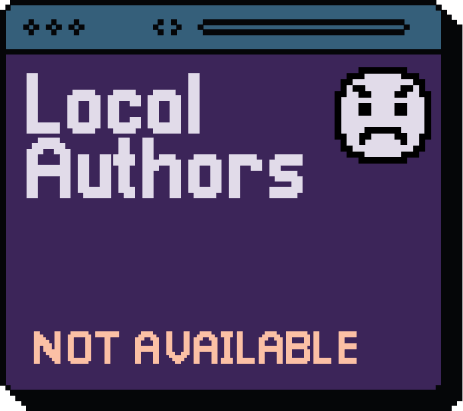

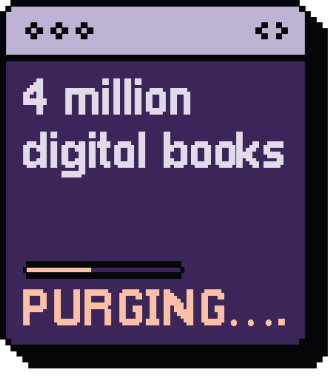
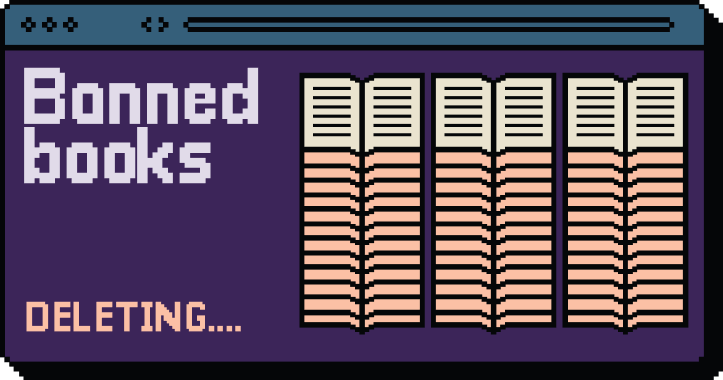

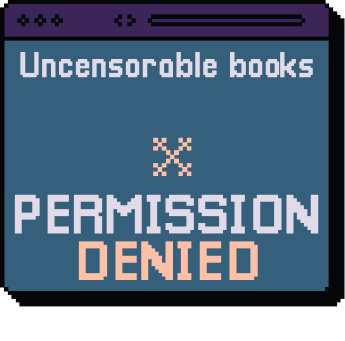
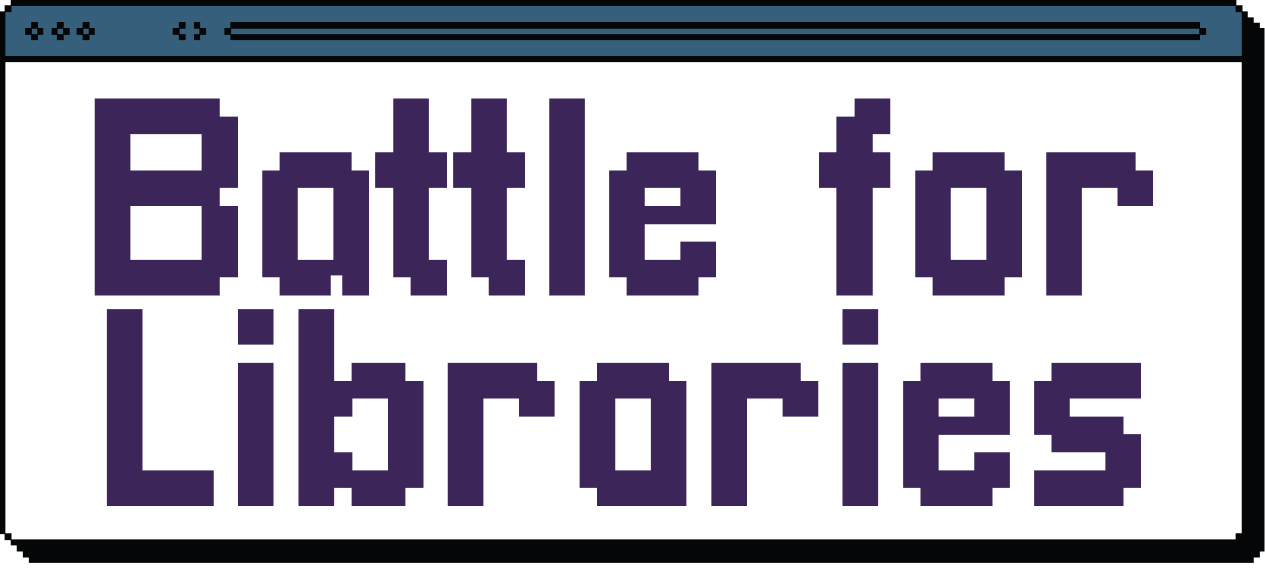
Battle for Libraries
On Friday June 28, 2024, the nonprofit Internet Archive is appealing a judgment that threatens the future of all libraries. Big publishers are suing to cut off libraries’ ownership and control of digital books, opening new paths for digital book bans and dangerous surveillance.
Join 30,000+ signers on the petition below to defend the Internet Archive, libraries’ digital rights, and an open internet with safe, uncensored access to knowledge.
FAQ
Big Media’s lobbyists have been running a smear campaign trying to paint the Internet Archive as a greedy big tech operation bent on stealing books—which is totally absurd. If you’ve ever used the WayBack Machine, listened to their wonderful archives of live music, or checked out one of their 37 million texts, it’s time to speak up. With publishing revenues approaching 30 billion per year in the US and monopolistic consolidation among publishing corporations, the publishing industry is incredibly powerful and moves aggressively to silence dissent.
The Internet Archive’s determination to keep fighting is a big deal!
Here are ways to support:
- Sign the petition above.
- Join 25+ major civil and human rights organizations in calling for a congressional investigation into surveillance and erasure in digital books—efforts that the Internet Archive is actively fighting against—at https://www.battleforlibraries.com/congress/
- Sign the Internet Archive’s petition calling on publishers to restore 500,000 books that have been removed from the Archive due to the lawsuit: http://letreadersread.com/
- Share your story about how having half a million books removed from the Internet Archive has impacted your reading or research—either on X or via this form.
- Post about why you love the Internet Archive and give them a tag. Please share with your community why this institution is important to you. Use the hashtag #DigitalRightsForLibraries!
- Invite your friends here, to BattleForLibraries.com, and ask them to sign the petition, too!
- Help spread the word! Click on any of the images below to download and set as a temporary profile picture.
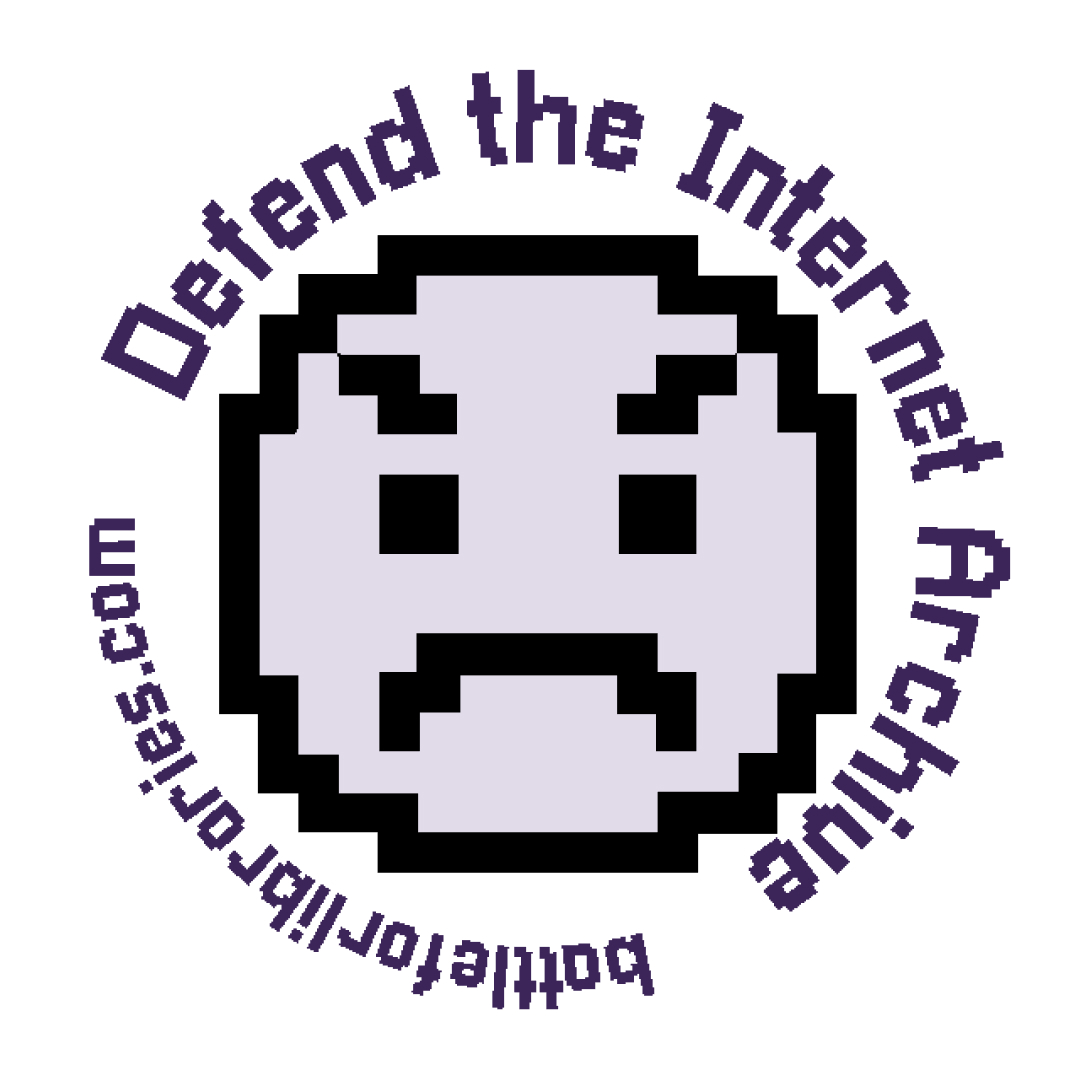


The Internet Archive has been scanning millions of print books that they own, and loaning them out to anyone around the world, for free. Other libraries like the Boston Public Library are using the same process to make digital books too.
This is happening because major publishers offer no option for libraries to permanently purchase digital books and carry out their traditional roles of preservation and protecting patrons’ human right to privacy.
Instead, libraries are forced to pay high licensing fees to “rent” books from big tech vendors that regard patron privacy as a premium feature (or disregard it entirely, seeking to profit from patron data). Such licensed books are also uniquely vulnerable to censorship from book banners and erasure. 25+ major civil and human rights organizations including the Athena Coalition, Color of Change, Reproaction, MediaJustice, UltraViolet, Presente.org, Institute for Local Self-Reliance, The Greenlining Institute, Woodhull Freedom Fund, the Surveillance Technology Oversight Project, and more recently called for a federal investigation into the harms of these practices. Library ownership of digital books is a principled and important value for the future of reading.
It is clear that under today’s regime, major publishers act as malicious gatekeepers, preventing the free flow of information and undermining libraries’ ability to serve their patrons. They do this in the name of their authors, who increasingly disagree with the premise of the lawsuit as they watch record publishing profits translate into more money for shareholders and CEOs—and less for authors and publishing workers.
Major publishers know it would look bad to sue the Boston Public Library. So instead, they’re attacking a groundbreaking nonprofit via a lawsuit with clear repercussions for every library in the US. On March 24, 2023, a lower court judge issued a (frankly terrible) ruling that stated the profits of big media companies are more important than the right of libraries to preserve our history and ensure it’s available to the world. Then, in a copyright troll move for the ages, the same attorney representing Big Publishing filed a second absurd lawsuit against the Internet Archive for its research library of old music recordings.
Nevertheless, the Internet Archive is appealing to a higher court and will keep fighting for the digital rights of libraries and readers in oral arguments on Thursday, June 28, 2024.
It is just as important to preserve digital books as paper books, especially given the rising popularity of digital books and the fact that many local and diverse voices are not published in print at all.
Today, most digital books can only be licensed, meaning there is effectively only one copy of a digital book and it can be edited or deleted at any time with zero transparency. In this scenario, profit-motivated big publishing shareholders for companies like Newscorp, Amazon, and Disney are in control of whether a book is censored or not.
But big publishers wouldn’t walk into a library and steal books off the shelves, and they also wouldn’t hack into a library’s computers and delete books. This is why it’s important that libraries actually own digital books, so that thousands of librarians all over are independently preserving the files of important books. This kind of decentralized curation makes books more resilient to censorship, keeping them available to the public and unaltered.
Increasingly, big publishing is turning into big tech, and seeking to make data on readers, students, and library patrons their next big product. Today, in order to loan digital books, libraries are forced to use third party tech vendors like Overdrive’s Libby, Elsevier’s ScienceDirect, or Hoopla. Often, these tech vendors spy on readers.
Libraries are legally forbidden from choosing a surveillance-free loan system for digital books because they don’t own the files they’re loaning. Without ownership, libraries will always be subject to the whims of big publishing and big tech, and get bullied into trading away the safety of their patrons for access to digital books.
Libraries have historically defended the right of their patrons to read without being spied on—a right that is increasingly important today as privacy rights are rolled back nationwide in the US, and asserting one’s bodily autonomy is criminalized in many states. Allowing tech corporations (and everyone who buys data from them, such as advertisers, law enforcement, and vigilantes) to harvest the names and locations of anyone who reads a book on reproductive or gender-affirming care is, at its core, a betrayal of the library’s promise to give readers of all kinds a safe place to learn.
Publishers are arguing that it is not okay to scan a copyrighted book, keep the paper copy in storage, and loan out the digital file in a one-to-one ratio just like any library loans any other kind of book. This practice is called Controlled Digital Lending. In 2023, a New York judge sided with them, putting profits before fair use and the rights of libraries.
On June 28, 2024, oral arguments will be heard in the Internet Archive’s appeal of that decision. In the weeks or months to come after the oral arguments, the appeals court will issue a new decision.
The Internet Archive legally can’t disclose any information about what’s happened behind closed doors so far, but we do know that over half a million books in their collection aren’t available to the general public anymore.
Thankfully, the battle isn’t over. Both sides seem ready to take this fight over the right to own digital books all the way to the Supreme Court.
For a while, many authors were confused about what’s happening and what it means. Big publishing lobbies have told them many…interesting…things. But as the implications for libraries’ rights become clear, more and more authors are now condemning this lawsuit and other anti-library actions from publishers.
It’s understandable for authors to be confused, after all, publishing lobbyists spend millions every year to try and pull the wool over all our eyes. But there are still some good people in publishing, including Neil Gaiman, Hanif Abdurraqib, Chuck Wendig, Naomi Klein, and 1000+ more authors who are deeply done with drinking publishing lobbyists’ kool-aid.
You can read the letter to big publishers from 1000+ authors at https://www.fightforthefuture.org/Authors-For-Libraries
Most people know the Internet Archive because of the Wayback Machine, which is essential infrastructure of the internet. It’s an archive of the history of the internet with 700 billion pages.
In a similar way, the Internet Archive’s library provides an archive of out-of-print, midlist, local, and diverse texts in addition to popular books. 37 million of them. And anyone with an internet connection can check out whatever they’d like to read.
This initiative is similar to the Brooklyn Public Library’s youth censorship circumvention efforts—but the Internet Archive’s library is accessible to everyone around the world, not just youth in the US. The Internet Archive’s digital books also are used for citations on Wikipedia, underpinning yet another core digital public good.
The Brick House is a writers’ and artists’ cooperative dedicated to digital ownership rights and to the preservation of libraries and the independent press. We publish the Flaming Hydra newsletter and a number of independent blogs. The cooperative can’t be bought or otherwise influenced from the outside; our work can’t be controlled by owners or investors, because there aren’t any.
As publishers, we sell our ebooks to libraries for keeps, and our new BRIET project will give other publishers and libraries free access to the same tools and techniques we’ve developed for ourselves, so that they too can sell—not license—their digital works to libraries.
We recognize that the Internet Archive is a great library—and so much more. Taken together, the Archive’s many initiatives and resources are our best hope for preserving freedom of information into the digital future. Please join us in supporting them.
Fight for the Future is a feisty, queer women led digital rights organization. Our work resisting censorship, advocating for free speech and expression, demanding big tech accountability, and promoting antitrust legislation speaks for itself, so feel free to check it out.
We’re here because this has gotten scary. The folks over at the Internet Archive are nerdy librarians and archivists working at a small nonprofit. They’re so far from the Big Tech “mouthpieces” that high-paid publishing lobbyists want you to think they are. And it’s time someone stood up for the totally essential and badass work they’re doing, as well as the future of all libraries. So, here we are.
WE <3 THE INTERNET ARCHIVE
"The idea of universal access to all knowledge is an amazing dream and the fact that there is now some people that have been crazy enough for 25 years to try to collect it all and put it together so anyone can access it freely at any time...this is so powerful and so important."
“I flat-out owe my career as a trans author to the unimpeded circulation of digital books: the first trans books that inspired me were digital, my own first books were published digitally. Book stores didn’t carry our books at first. Therefore, any readers that have felt their own emotions changed by my published work–no matter in what medium–ultimately also owe that change to digital books. Everybody benefits when digital books are accessible.”
"The Internet Archive is a library, and, like any library, it is allowed to scan the books in its collection and circulate them to its patrons."
"Back in the 1990s, I was a rock n' roll historian and I wrote the liner notes for compact discs...It's just such a thrill now to have all this on the Internet Archive and I'm very grateful to those making it possible."
"The suit raises the threat level and the public anxiety that’s always surrounded the Internet Archive. If the archive were to die by a thousand legal cuts or a solar flare, hardcopies could rot in shipping containers; code would simply vanish."
"About 2 years ago, my wife Julie died of breast cancer after a five year struggle. As part of the process of remembering and reliving her life, I decided to collect all the photos and digital items that I could find...I had to really go out and find it. I used the Wayback Machine.....I'm eternally grateful for the services I found at the Archive."
"A few years ago, I started working with a Japanese American historical organization called Densho, and we decided to pull together the very best books about the Japanese American incarceration and to digitize them. Now anyone can go t the Internet Archive and check out that book or flip through its pages. It's a way of bringing this story into the future."
"It’s the height of hypocrisy for publishers to attack a basic thing that libraries have done for centuries: lending out books that they own for limited periods of time to support the spread of knowledge"
“Libraries and librarians are champions of both the under-served reader and the under-seen writer. I used to work in the public library, and I cherished that the library helped writers find readers, and readers to find writers — and writers of every level, to boot, from midlist or bestseller or debut. It is vital we make sure these seeds are planted, watered, and allowed to grow unhindered.”
“Without libraries my peers and myself wouldn’t have had the access to literature that we identify with and encouraged us to tell our own stories. To restrict their abilities to loan books is to stifle voices like ours “
"The role of this institution as a steward of cultural posterity is unmatched and crucial for the survival of our civilization."
"Owning media is now an act of countercultural defiance."
"The Archive is such a phenomenal resource. It is so critically important in our current environment of information glut and fleeting but profoundly impactful content. It has been invaluable to my team as a tool."
"It's been such an amazing resource for me and so many journalists over the years... We've used them for countless stories, every single day."
“When I heard Marygrove was going to be closing, it broke my heart...When they told us they were going to be digitizing the library, I didn't exactly know what that meant. Actually seeing it now—this was a stroke of genius. This Internet library stuff is a pretty good idea.”
“The Internet Archive saved my library in the best way possible. I hope millions of people will use it [to research] space, architecture, costumes, towns, cities, administration, foreign countries… the crime business! Westerns! That’s what is amazing to me, that it will be open to everybody.”
"I own two of the Julian books in multiple copies at school, but I couldn't get all those books to people [during covid lockdowns]. That's why I sought out the Internet Archive....To me it was a matter of survival. Children need books and nothing is going to stop me from getting stories to them."
"As an autistic person, it was a life-changing experience for me to borrow a book to read on my phone. I actively use the collections to aid my school work - sometimes it's explained in different words that help me understand more.
"I don't have much money to spare for books, so your website and others like it are my lifeline to the world of self-education. I feel very grateful. Long live the democratization of knowledge.
"I use the Internet Archive because I have difficulty handling physical books...During 2020, my university library was closed because of COVID-19. I could access recent publications online but not older material that is only available through Internet Archive."
“Internet Archive helped me help a student! I have students in one class that attend from around the globe. One student was unable to find the required texts and our university did not have digital copies that could be lent. If she were to order the book – not carried in any local stores – it could take up to 3 months for them to arrive, long after the course was over!”
“Even before the pandemic, depending on the topic of my essay and thesis, it was difficult to find books on certain topics in local libraries or bookstores…Access to knowledge shouldn’t be for the rich and privileged.”
“I’m a Digital Librarian in a public library in the small town of Hokitika, New Zealand, whose job is making local history more accessible to the community – many of the New Zealand history works in our public library collection are rare or reference-only. It turns out many works of New Zealand history have been digitised by the Internet Archive from US collections”
“As a non-academic with interests in literature, history, and philosophy, the IA gives me access to books I can’t otherwise afford or access.”
“I spent months of 2020 bed-ridden, and was able to view items from your digitized collection. I would not have been able to go to any physical place for my books, and the titles I was looking for were sometimes available only on the Internet Archive. There are no other means for me, in my part of South America, to have access to limited-circulation ancient newspapers of other continents without digitizing and digital libraries. Without the Internet Archive and other libraries like it, I would have no alternatives.”
“Living in a developing country with so many political and economic turmoils, I believe that the Internet Archive provides a huge service and a unique platform for dissolving the injustice and inequality of [access] to knowledge between disadvantaged countries and classes.”
“I’ve used materials from the Internet Archive many times throughout my time as an undergrad studying history…There are many primary and secondary sources on the IA that I was unable to find anywhere else online or in physical copies through my university’s library. Many of the books I’ve accessed through the IA have been out of print for many years, so it’s incredibly helpful to have [access] to titles that would otherwise be nearly impossible to track down.“
“I am surprised that books pertaining to learning the Urdu language are available on archive.org, and those which were used for preparation in the civil services. These books are just not available in the country anymore and are immeasurably useful as far as the history of the colonized area is concerned. These are not published anymore, and finding a copy is exceedingly rare. This is why archive.org is important and we should endorse and support it.”
"Teachers are desperate for any and all help right now and luckily our communities and beyond are coming to the front lines to help advocate for us! We really appreciate all you have done to help us!"
"Thank you for working on behalf of those of us who are promoting literacy, even through difficult times."
"My students could not finish the semester without the National Emergency Library. It has been a total lifesaver. Not for books that are “in print” electronically. My library has been buying those. But for all the 30 to 50-year-old books that are out of print but essential for doing good history research."
"I think the Internet Archive has the moral high ground in launching the National Emergency Library. There’s no way people who already contributed to paying for access to books through taxes or tuition can individually purchase every book they might want to consult while the libraries they relied on (and helped to fund) are closed. We need to consider the public good in this crisis.”
“We didn’t imagine something like the Covid crisis could happen, but for our preservation efforts, this is the Big One. We are really lucky to be able to provide access to information that we couldn’t otherwise without the Internet Archive.”
"Working toward educational equity should be core to the mission of every school. By supporting resource access, instructional rigor, and special needs access, tools like the Internet Archive’s digital libraries can help schools move toward this essential goal."
“I used the National Emergency Library for personal reading through the pandemic. I am a high-risk person for [COVID-19], so I have been very limited for the last three months. I am also disabled and cannot easily visit the library even when it is open to check out books. I’ve relied on the Internet Archive for many years to find things to read to help me occupy my time when I can’t do much of anything else but read.
“I think people really underestimate the importance of accessibility in educational materials. It’s very difficult to understand the impact something you don’t have access to *could* have. Much easier to take for granted the things we already have access to, thinking it is so for everyone.”
“The ability to read in the safety of my home is priceless because I have an autoimmune disease.”
"I was able to find basic life support manuals (BLS Provider Manual) needed by front line medical workers in the academic medical center I work at."
‘The Internet Archive has been a godsend for my students at Santa Clara University this quarter—especially with all libraries and interlibrary loan services closed. My students wrote sophisticated research papers on a variety of subjects during spring quarter. The Internet Archive was a major factor in their success."
"I think in the end, [Controlled Digital Lending] drives sales because you are finding readers you wouldn’t normally have. Those readers aren’t getting a copy that they keep forever — it’s a copy that’s going to lead them to want to own it."
"Here, because digital technology is involved, the publishers are asserting that they can control how/when/where/why libraries lend out digital copies.… In other words, they want to change the rules in their favor and take away one of the most cherished and valuable contributions that libraries make to society—allowing members of the public to read for free from the library’s collection.”
"Libraries — a backbone of American democracy, and the ones best poised to respond to the existential threat of misinformation — need to be able to overcome those barriers to protect our democracy."
“The Internet Archive is an invaluable, indispensable asset for researchers, all three of its core features: archived sites, archived files, and books that can be borrowed.”
“Libraries are “palaces for the people,” as the title of Eric Klinenberg’s book says so well. They are learning spaces, safe spaces, caring spaces, public spaces. They allow members of the public to see themselves as equal to others and welcomed into this space. Libraries’ ability to collect, preserve, and share resources is a sine qua non of democracy. Bullies who pick on libraries are anti-democratic.”
“Libraries were a formative part of me learning to read, and they should be free for all forever.”
“Copyright has in the past century been twisted to benefit corporations and other businesses, not creators and their estates, nor libraries who serve a public interest. It is high time to review how we have turned our system away from allowing the spread of knowledge while ensuring artists get duly paid into one where the wealthy extract endless rent from the hard work of others and limit public access to that knowledge.”
“Libraries are a vital institution to cultivate engaged readers. Allowing them to carry books in formats that readers actually use only helps authors. Not allowing libraries to function puts the control of reading into the hands of big tech companies.”
“Libraries are the guardians and the bulwark of cultural diversity and inclusion, particularly for those who don’t have the means to access culture by other pathways. They are the place where people, particularly children, can access books and other materials about the topics that concern them, embarrass them, or that they don’t feel that they can talk with anyone else. The status of libraries as a place free of censorship and surveillance, to seek knowledge we need and stories that reflect us, is one of the keystones of a free, open, and democratic society, and every inch that we lose in this battle contributes to the disintegration of civic space.”
“I write because I want to be read. My most recently published book is on the Internet Archive—and that delights me. I also make use of online archival material frequently in my creative and critical work. Moreover, as a college administrator in a small-island state (or, more accurately, a Big Ocean Nation), I know how important electronic resources are to global access and equity.”
“It’s absolutely shameful that publishers would try to destroy the efforts of the Internet archive. The future is open access publishing!”
“Closing off libraries to fair access in the digital age closes off one of the most important tools for research we have. The Internet Archive’s controlled digital lending approach is an excellent way to quickly research topics from primary sources that may not have digital equivalents. The library should be allowed to reasonably keep up with the times, and we should not allow publishers to attempt to redefine it just because the format is changing.”